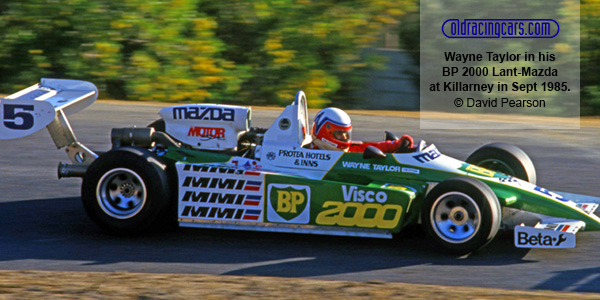
South African Formula 2 1985
After Ian Scheckter and Ken Howes moved to the US to compete in the IMSA series, Gavin Hards took over the running of Team Gunston, with John Moni as driver.
With the withdrawal of Sigma Motor Corporation's sponsorship deal, race organisers decided to call the Formula SA cars "Formula 2" instead of "Formula Sigma" for 1985. The previous Formula Atlantic name had largely disappeared from international motor racing at this time as the Australian and New Zealand series either used Formula Mondial or Formula Pacific, the British and Japanese series had been dropped, and the North American series had closed after the 1983 season, although a new series would grow out from US west coast origins.
The only new car to arrive was John Moni's March 842, but that did not work well. Trevor van Rooyen in DAW's Maurer MM83 and Wayne Taylor with a choice of Ralt RT4/82 and Lant RR84 were the main competitors. Van Rooyen proved to have the edge.
The races
26 Jan 1985 > Kyalami
09 Feb 1985 > Killarney
09 Feb 1985 > Killarney
23 Feb 1985 > Kyalami
16 Mar 1985 > Welkom
27 Apr 1985 > Kyalami
01 Jun 1985 > Kyalami
15 Jun 1985 > Killarney
15 Jun 1985 > Killarney
27 Jul 1985 > Kyalami
10 Aug 1985 > Aldo Scribante
10 Aug 1985 > Aldo Scribante
14 Sep 1985 > Killarney
14 Sep 1985 > Killarney
05 Oct 1985 > Welkom
1985 South African Drivers Championship table
| 1 | Trevor van Rooyen | Maurer MM83 - Mazda 12A | 154 pts | |
| 2 | Wayne Taylor | Lant RR84 - Mazda 12A | 122 pts | |
| 3 | Bernard Tilanus | Ralt RT4/82 - Mazda 12A | 94 pts | |
| 4 | John Moni | March 842 - Mazda 12A | 50 pts | |
| 5 | Dave Charlton | Maurer MM82 - Mazda 12A | 21 pts |
To prevent any further problems with silencers, SA Motorsport sent a strongly-worded instruction to race organisers that Clerks of the Course must enforce the 115 db noise limit in 1985, no matter how much the competitors may plead for another extension. The Mazda 12A engines used in Formula SA were now reported to be generating 300 bhp, but these engines were no longer produced in South Africa, and Sigma closed down their competition department.
In July, there was discussion between the drivers' organisation and SA Motorsport about opening up the engine rules for 1986, and allowing other locally produced engines. Four-valve and turbocharged engines were considered, and Nissan, Toyota, Ford, Alfa Romeo and Volkswagen were all mentioned. The cars that would be allowed in 1986 would include one-year-old imported chassis but from 1987, all chassis would have to be manufactured locally.
However, within a month the political and economic environment in South Africa shifted significantly after a defiant speech by apartheid President Piet Botha, in which he refused to make the expected constitutional changes in the direction of majority rule. Despite the best efforts of Reagan in the US and Thatcher in Britain to stymie sanctions against the apartheid regime, US banks withdrew from South Africa and capital flight intensified. The Rand plunged in value. The capital that was able to move out of South Africa included racing cars, and many of the newer ex-F2 cars were exported between mid-1985 and the end of 1986. Even the two main newspaper sources we use for this coverage of Formula SA were deeply involved: the Rand Daily Mail was the leading anti-apartheid newspaper and after a covert attempt by the government to buy its publisher failed, it was forced to close in early 1985. The government had set up The Citizen in 1978 to defend government policy in opposition to the Rand Daily Mail.